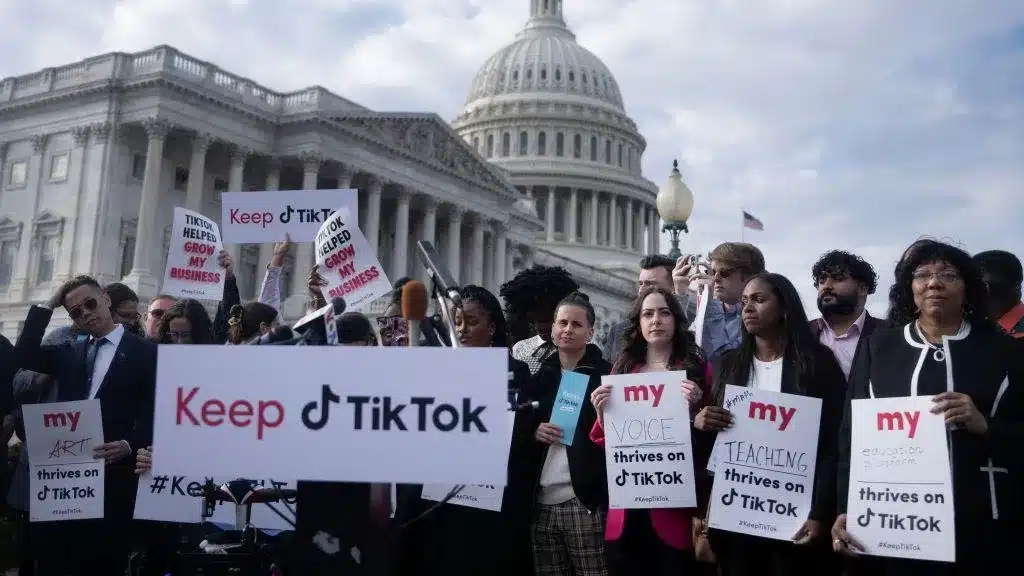Washington/Beijing – As negotiations between the United States and China reach a critical juncture over the TikTok deal, Beijing appears positioned to secure significant strategic advantages from what many are calling a “win-win” framework agreement that could reshape how Chinese technology operates in American markets.
Framework Agreement Signals Major Shift
President Donald Trump and Chinese President Xi Jinping are expected to finalize discussions on Friday regarding a TikTok deal that would allow TikTok to continue operating in the United States under American ownership while preserving key Chinese interests.
The proposed TikTok deal framework suggests TikTok’s US operations could be acquired by a consortium including technology giant Oracle and prominent investment firms Andreessen Horowitz and Silver Lake, according to recent reports. However, the structure of this TikTok deal appears to offer China more than initially anticipated.
The Algorithm Remains China’s Crown Jewel
At the center of this complex negotiation lies TikTok’s proprietary algorithm – the sophisticated “secret sauce” that has made the platform uniquely successful in content recommendation and user engagement.
Strategic Licensing Instead of Sale
In a surprising development, China’s top cybersecurity regulator has indicated that Beijing may permit ByteDance to license the algorithm and intellectual property to US companies rather than transfer ownership outright. This represents a significant departure from China’s previously hardline stance.
“It simply doesn’t make business sense for ByteDance to hand over its most valuable asset when a lighter version can keep the app running without giving away its edge,” explains Dr. Kokil Jaidka, computing expert from the National University of Singapore.
What China Gains from the Deal
1. Technological Sovereignty Preserved
The licensing arrangement allows ByteDance to maintain control over its core technology while accessing the lucrative US market. This creates what experts describe as a “TikTok Template” for other Chinese companies seeking American market entry.
2. Economic Leverage in Trade Negotiations
With TikTok generating an estimated $30 billion of ByteDance’s $39 billion global revenue in 2024, and the US representing approximately 50% of the company’s overall revenue, China retains significant economic leverage in broader trade discussions through this TikTok deal.
3. Precedent for Future Tech Exports
Tech expert Kevin Xu notes that this TikTok deal establishes a framework for Chinese companies like BYD or CATL to enter US markets through licensing arrangements, potentially extending to critical technologies including batteries and rare earth materials.
US Concerns Remain Unresolved
Despite the proposed framework, significant challenges persist in addressing the national security concerns that initiated this diplomatic standoff.
Congressional Approval Required
Republican lawmaker John Moolenaar has expressed concern that the current framework may not fully eliminate Chinese government influence. Legal expert Hdeel Abdelhady told the BBC that “the statute requires full separation from ‘foreign adversary’ control, and a license would not appear to meet that test.”
User Experience Implications
Dr. Jaidka warns that American users may experience a “stripped-down” version of the application, potentially showing less diverse content than users elsewhere. She describes the likely outcome as “a lighter, slower, more domestic version – while ByteDance keeps the crown jewels in Beijing.”
Complex Implementation Challenges
Technical Integration Issues
Questions remain about how a US-owned TikTok would interact with ByteDance-controlled TikTok operations in other global markets, creating potential technical and operational complications.
Corporate Governance Requirements
As a private company, ByteDance requires board approval for any licensing arrangement, adding another layer of complexity even with Chinese government approval for technology export controls.
Political Volatility Risks
The unpredictable nature of US-China trade relations introduces ongoing uncertainty, with Dr. Jaidka noting that any agreement “will always sit under a cloud” of political mistrust.
Beijing’s Strategic Timing
Former World Bank Country Director for China, Bert Hofman, observes that Chinese officials have described recent talks as “in-depth, constructive and candid,” suggesting satisfaction with negotiation progress.
Buying Time for Broader Trade Discussions
The TikTok deal could provide crucial breathing room for addressing larger trade issues, including:
- High tariff disputes affecting both economies
- Export controls on rare earth materials
- Agricultural trade relationships
- Technology transfer restrictions
Long-term Implications
Precedent for Tech Diplomacy
This agreement could establish new models for how authoritarian and democratic nations navigate technology transfer and data sovereignty issues in an increasingly digital global economy.
Competitive Advantages Maintained
By retaining algorithmic control, China preserves its competitive edge in social media technology while other companies like Instagram and YouTube continue struggling to replicate TikTok’s engagement success with their Reels and Shorts features.
Conclusion: A Calculated Victory for Beijing
While the United States may achieve its immediate goal of ensuring TikTok continues operating under American oversight, China appears positioned to secure longer-term strategic advantages.
The deal allows Beijing to:
- Export Chinese technology on its own terms
- Maintain control over proprietary algorithms
- Create templates for future market entry
- Preserve economic leverage in trade negotiations
As one expert summarized: “A US TikTok will look like the same app, but behind the scenes it will run on borrowed code, firewalled data, and political trust that could vanish overnight.”
The final agreement, if reached, may indeed represent a rare breakthrough in US-China relations – but perhaps not the complete victory American negotiators initially envisioned.
This analysis is based on ongoing diplomatic discussions and expert commentary. Final agreement terms remain subject to approval by both governments and relevant corporate boards.


![Nepal Voter Registration Now Possible at Any Election Office – Complete Guide [2025 updated]](https://nepaliict.com/wp-content/uploads/2025/10/Nepal-voter-registration.jpg)





















Comments